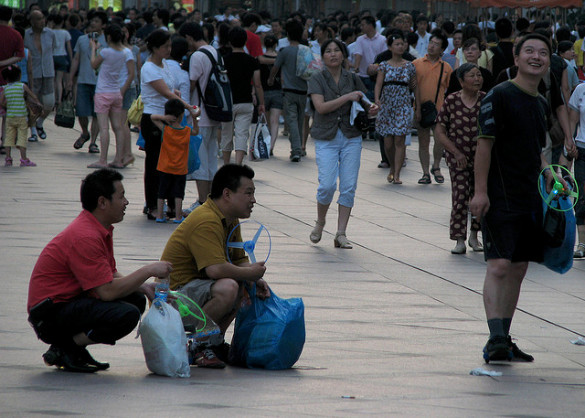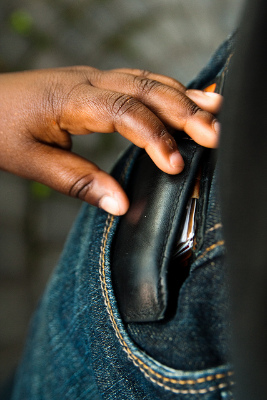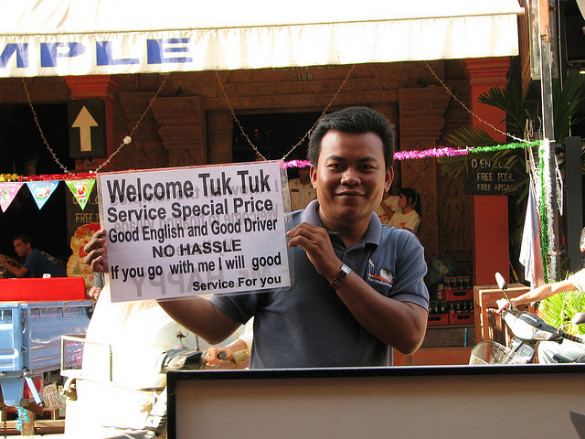One great reason for traveling in developing countries is to take advantage of super cheap prices. There’s nothing like popping into an alleyway in Hanoi for a steaming bowl of pho, all for $1. Or staying in a nice, private hostel room in Cusco for $20. Or taking a posh, overnight Argentine bus for $40.
Getting value is a great part of travel, particularly when you’re doing it on a long-term basis. But when a western tourist is traveling in a developing country, you have to keep in mind that what many of us make in a month at home can be equivalent to one of the local person’s annual salary (the disparity can be even more, depending on your occupation and the country you’re in).
Western tourists are often seen as an opportunity, and there are no shortage of shady touts, cab drivers, tuk-tuk drivers, or market workers looking for that unsuspecting tourist to rip off.
We know that the vast majority of locals are great people, wanting nothing more than to make sure you have a lovely time in their hometown. But where there are tourists, there are also con men, just looking for their next mark.
- How do you spot those who don’t have your best interest in mind?
- How do you deal with someone when they are clearly trying to rip you off?
- What do you do when you catch someone in the act?
All are things you will most likely encounter during the course of your big trip, and by knowing how to deal with these encounters, you’ll save yourself time, money, and lots of hassle.
Who are these people?

They come from all walks of life, but keep in mind that you are most likely much, much, much, much wealthier than those who try to rip you off. You typically deal with shady touts and people trying to rip you off in developing countries where tourists are prevalent. This means that you are in a country where the poverty rate is extremely high, and there are lots of people around who are extremely poor.
Keep this in mind when getting angry and fed up with people looking to get the best of you. It’s difficult to do, and at some point you will lose your patience. And even though poverty does not make it okay to be a thief, much of the time these people are only trying to put food on the table. It’s not like they’re putting your $5 towards an iPad.
The important thing is to always be on guard. Whether it’s for pickpockets in a crowded marketplace or the cab driver whose taxi you just hopped into, scammers are everywhere while you are traveling. Maintaining an awareness at all times will help you stay safe, and the minute you let your guard down is when you get ripped off.
Pickpockets and thieves
 Any time you are on the road in a foreign place (and many times at home), you need to always be aware of pickpockets and thieves. They are everywhere in the world – from New York to Melbourne to Barcelona to La Paz.
Any time you are on the road in a foreign place (and many times at home), you need to always be aware of pickpockets and thieves. They are everywhere in the world – from New York to Melbourne to Barcelona to La Paz.
Tips for deterring pickpockets and thieves
- If you must carry your valuables with you, carry them in a money belt. Passport, money, and credit cards should never go in a pocket or wallet.
- When leaving your room with a camera, make sure you have it secured in a bag and never just around your neck. Pacsafe makes wonderful, durable, slash proof bags that are perfect for carrying around cities.
- Consider a decoy wallet. Put an old wallet in your pocket with a small amount of cash, and an already used visa gift card that looks like a credit card. If someone approaches you and tries to mug you, give up the decoy wallet.
- Don’t try to be a hero. Even if you give up your expensive camera or wallet with credit cards and passport, it’s better than being attacked and risking injury or worse.
- If you are traveling with a partner, make sure to watch each other’s backs at all times.
- Don’t fall for the typical scams – someone squirts mustard on you to distract you, offers to help clean it, while the perpetrator or a buddy lifts your wallet or bag from you. There are tons of scams like this – read about them before traveling to a certain country.
- Don’t wear anything flashy. Simple advice that can save you time and time again. Look like a hippie, deter people who think you may have money.
- Leave your rings at home. Like the above tip, if you are married and have a big diamond ring, it’s probably best to put it in a safe deposit box at home. Either get a cheap, silver band for a ring, or buy one from a market at some point during your trip – you will have a great story.
How to deal with con artists
Con artists and scammers are always trying to stay ahead of the game, one step ahead of unsuspecting tourists. By preparing and doing just a little bit of research, you can ward off many of the scams before they even happen.
Nearly every guidebook will talk about common scams like the mustard one from above. In Bangkok, tuk-tuk drivers tell tourists every single day that the Grand Palace, one of the city’s top attractions, is closed for the day. They then offer to take the tourists on a special trip just for you to other temples around the city (yet they fail to mention their friends’ jewelry and rug shops, where you will spend most of your day). By reading about Bangkok before arriving, you should already know about this scam, yet tourists fall for it every single day!
Being educated about the place you are visiting certainly helps. It’s also important to trust your instincts. If something sounds like too good of a deal to pass up, then it probably is. If you get an uneasy feeling about hopping in a particular taxi or dealing with a particularly aggressive tout, then trust that feeling and walk away.
What to do when you do get ripped off
If you get mugged or robbed, then you probably want to file a police report, especially if you have travel insurance and plan on recouping any of the costs. If it’s something minor, like a cab driver taking you for a ride or a tuk tuk driver hassling you, then you can deal with it in any number of ways.
Taxi drivers all over the world try to rip off people who don’t live in their towns. Thankfully GPS and Google Maps are making this more difficult, but trying to find a signal and maps in the middle of India to check your route can be challenging. If you feel like a taxi driver is taking you for a literal ride, simply question him or her and make it clear you know what they are trying to do. Make sure to remain calm, particularly in cultures where screaming and yelling is not common, accepted, or understood (like Thailand).
Another option is to just wait until you get to your destination and short pay the driver. This will result in an altercation of sorts, but you can usually shut them up by offering to get a police officer to resolve the situation. Standing your ground, remaining confident, and being firm all helps, but be smart about it. You’re not looking to get into a fistfight with a local here, and chances are you have been taken for a small amount, so keep everything in perspective before things go too far. Sometimes you just have to take your lumps and move on.
Bargaining

In most of the world, bargaining for goods is a way of life. That’s just how things work, so you better get used to it if you plan on taking a RTW trip. For many people, this is a fun and exciting part of travel. For others, it’s something they loathe, and there’s nothing wrong with that, but you do need to accept that it’s something you’ll have to do.
When bargaining, whether it’s for a souvenir to bring home as a gift, or a warm hat you need because it’s gotten colder out than you expected, keep in mind that this is the vendor’s livelihood. Yes, they are going to start with an extremely high offer. But it’s all a game to most. Play along, have fun. Offer half or a little less than half as a starting point, and then let the negotiations begin. Usually you can agree on a fair price that both of you are happy with (though neither of you will admit). Sometimes you can’t agree, though, and even though it’s considered rude to walk away and not buy anything after negotiating for a while, you are not obligated to pay more than you want. But if you are arguing over a dollar or two, then you may want to think things over, keep some perspective, and just pay a little more than you initially hoped.
Do your homework
The most important thing you can do to minimize the chances of getting ripped off is to read, research, and do your homework on a destination before arriving. It’s not difficult to find information about typical scams, cultural differences when it comes to bargaining and acting in public, and tips on not getting ripped off. Simply taking an hour or so on the plane should get you up to speed on how to stay safe when entering a new country.
Chances are you will get taken advantage of at some point in your trip. The odds are against you, but that’s just part of traveling. How often it happens usually depends on how prepared you are. By doing a bit of research, you can safeguard against many of these petty thieves and scams. Of course sometimes things just happen, and bad luck can strike at any moment. Most local people want you and your business, so just because you have a few bad experiences, don’t let that sway your thoughts about a city, country, or its people as a whole.
Photo credits: 1, 2, 3
[more link=”https://www.bootsnall.com/rtw/guide-to-working-on-the-road.html”]Next: Guide to Working on Your RTW[/more]